19-11-2018, 20:57 Category: English, News
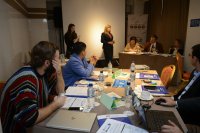 This is the statement by the participants
of the laboratory "Political space for
CSOs: democracy + human rights= sustainable development”.
This is the statement by the participants
of the laboratory "Political space for
CSOs: democracy + human rights= sustainable development”.
The event was held on November 15, 2018 within the framework of the XII International Festival of Human Rights Documentary Films in Bishkek.
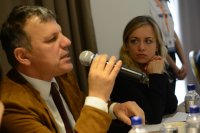 Participants were welcomed by Dimitris Christopoulos, president of the
International Federation for Human Rights, FIDH (France), who arrived in
Kyrgyzstan specifically at the festival, official meetings and interactions
with the civil society.
Participants were welcomed by Dimitris Christopoulos, president of the
International Federation for Human Rights, FIDH (France), who arrived in
Kyrgyzstan specifically at the festival, official meetings and interactions
with the civil society.
Over 30 participants of the workshop were human rights activists, leaders of CSOs, experts, representatives of the Ministry of Justice of the Kyrgyz Republic, activists from Kyrgyzstan, Kazakhstan, Tajikistan, Italy, France, Czech Republic who worked in the four groups: "Freedom of expression”, "Freedom of assembly”, "Freedom of association”, "Participation of women and migrant workers”. These working groups were created for a discussion of promotion of key liberties required to make political space function and to achieve Sustainable Development Goals. Experts delivered their reports on the situation of these freedoms amid current realities and civil society issues in Central Asia.
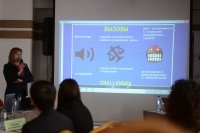 "The
situation of the freedom of expression is similar in all the three countries –
Kyrgyzstan, Kazakhstan and Tajikistan,” Inga Sikorskaya, programme
director of the School of Peacemaking
and Media Technology in CA (Kyrgyzstan), said presenting her speech on "Freedom
of expression in CA: challenges, trends, solutions”. "The main risks are broad
interpretation of the laws on inciting hatred, confusion of this interpretation
with extremism, which allows prosecuting independent activists, journalists,
human rights defenders; growth of hate against socially disapproved groups in
our countries, as well as the constantly high level of propaganda, which affects
the shaping of public opinion and public discourse.”
"The
situation of the freedom of expression is similar in all the three countries –
Kyrgyzstan, Kazakhstan and Tajikistan,” Inga Sikorskaya, programme
director of the School of Peacemaking
and Media Technology in CA (Kyrgyzstan), said presenting her speech on "Freedom
of expression in CA: challenges, trends, solutions”. "The main risks are broad
interpretation of the laws on inciting hatred, confusion of this interpretation
with extremism, which allows prosecuting independent activists, journalists,
human rights defenders; growth of hate against socially disapproved groups in
our countries, as well as the constantly high level of propaganda, which affects
the shaping of public opinion and public discourse.”
For a few hours, working groups were discussing and developing recommendations and action plans. As a result, every team represented their packages of solutions.
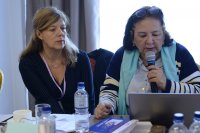 Muattar Khaydarova, an expert from Tajikistan, speaking
about the trends and risks in the sphere of freedom of association, announced the
recommendations worked out by the group of participants specifying the need to
improve the laws on financing NGOs from internal sources, emergency adoption of
law on charitable organisations, stopping the use of tax law abuse as a
leverage on the civil society in Tajikistan.
Muattar Khaydarova, an expert from Tajikistan, speaking
about the trends and risks in the sphere of freedom of association, announced the
recommendations worked out by the group of participants specifying the need to
improve the laws on financing NGOs from internal sources, emergency adoption of
law on charitable organisations, stopping the use of tax law abuse as a
leverage on the civil society in Tajikistan.
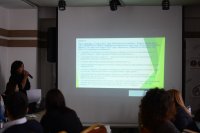 Gulshaiyr Abdirasulova, a
representative of Kylym Shamy (Kyrgyzstan), introduced the audience to the
peculiarities of legal proceedings related to the right to freedom of peaceful
assembly. The working group with her participation suggested a series of steps
to improve of this sphere. In particular, the group recommended developing and
introducing a programme on the compliance with the freedom of peaceful assembly
into training modules for judges, implementing the process of evaluation of
judges and law-enforcement bodies regarding the human rights knowledge, shaping
the practice of decision-making by the UN Human Rights Committee, an entity supervising
the implementation of the International Covenant on Civil and Political Rights
in member states.
Gulshaiyr Abdirasulova, a
representative of Kylym Shamy (Kyrgyzstan), introduced the audience to the
peculiarities of legal proceedings related to the right to freedom of peaceful
assembly. The working group with her participation suggested a series of steps
to improve of this sphere. In particular, the group recommended developing and
introducing a programme on the compliance with the freedom of peaceful assembly
into training modules for judges, implementing the process of evaluation of
judges and law-enforcement bodies regarding the human rights knowledge, shaping
the practice of decision-making by the UN Human Rights Committee, an entity supervising
the implementation of the International Covenant on Civil and Political Rights
in member states.
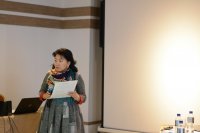 Aina Shormonbayeva, president of International Legal
Initiative Public Foundation (Kazakhstan) presented recommendations of her
group "Participation of women and migrant workers”.
Aina Shormonbayeva, president of International Legal
Initiative Public Foundation (Kazakhstan) presented recommendations of her
group "Participation of women and migrant workers”.
"The governments and the parliament must respond to public interest and demands, which is the key principle of the open political space for CSOs”, Shormonbayeva said. Residents of villages Min Kush, Zhumgal district of Naryn oblast, Kyrgyzstan, arrived specifically to take part in this workshop because they live in an environmentally fragile area due to uranium mining implications, where people suffer from diseases and poverty. The activists recommended that the authorities should handle this situation as soon as possible. Particularly, they recommended developing a special mechanism of enforcement of the decision to relocate the residents of 23 houses in the village of Min Kush.
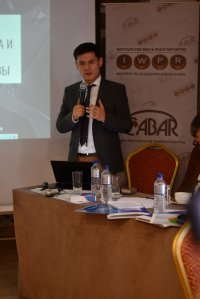 Ermek Baisalov,an editor of analytical portal
CABAR.asia, emphasised the importance of interaction between the expert
community and civil society organisations in Central Asia. The expert capacity
is a serious basis for joint solution of issues, he emphasised.
Ermek Baisalov,an editor of analytical portal
CABAR.asia, emphasised the importance of interaction between the expert
community and civil society organisations in Central Asia. The expert capacity
is a serious basis for joint solution of issues, he emphasised.
 The four working groups suggested their
action plans to promote the stated freedoms that are needed by the countries to
achieve Sustainable Development Goals. Some of suggestions were to obtain the
decision of the Plenum of Supreme Court regarding the interpretation of
articles related to the incitement of hatred and concerning the freedom of
expression in media and on the internet, to adopt the anti-discrimination law
of the Kyrgyz Republic in order to protect the rights and freedoms of diverse
groups in the society, to adopt the law on charitable organisations, joint work
to reduce unemployment and labour migration, to introduce 40 per cent quota for
the representation of women in government, to introduce the practice of public hearing
of public meeting law enforcement, to encourage the use of UN human rights
monitoring mechanisms: use of specific UN procedures, individual appeals to the
UN Human Rights Committee, appeals to special UN rapporteurs.
The four working groups suggested their
action plans to promote the stated freedoms that are needed by the countries to
achieve Sustainable Development Goals. Some of suggestions were to obtain the
decision of the Plenum of Supreme Court regarding the interpretation of
articles related to the incitement of hatred and concerning the freedom of
expression in media and on the internet, to adopt the anti-discrimination law
of the Kyrgyz Republic in order to protect the rights and freedoms of diverse
groups in the society, to adopt the law on charitable organisations, joint work
to reduce unemployment and labour migration, to introduce 40 per cent quota for
the representation of women in government, to introduce the practice of public hearing
of public meeting law enforcement, to encourage the use of UN human rights
monitoring mechanisms: use of specific UN procedures, individual appeals to the
UN Human Rights Committee, appeals to special UN rapporteurs.
All the recommendations will be sent to the government, parliament, international organisations, media outlets.
The laboratory was organised by the School of Peacemaking and Media Technology in CA jointly with the human rights movement Bir Duino Kyrgyzstanand the representative office of the Institute for War & Peace Reporting (IWPR) in CA.
A photo report of the laboratory is available on the official page of the XII International Festival of Human Rights Documentary Films on Facebook: http://catcut.net/JWhx
Alina Amilaeva, programme assistant of the School of Peacemaking and Media Technology, Kazakhstan.
The article was prepared by the School of Peacemaking and Media Technology in CA, an official media campaign partner to the XII International Festival.

The School of Peacemaking and Media Technology in Central Asia announces an annual competition among students from Kyrgyzstan, Kazakhstan,…

25 journalists and media workers from various regions of Kyrgyzstan have been trained to counter the propaganda of violent extremism and hate in…